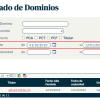En OpenVZ tenemos un comando muy útil para poder ver toda la información de un servidor virtual en tiempo real, si se sabe utilizar correctamente, podemos ver la mayoría de propiedades cómo: ips, hostname, ctid, load average, etc.
Si ponemos vzlist en nuestra linea de comandos sin ningún parámetro nos salen los fundamentales, ctid, numero de procesos, estado, ip principal y hostname.
CTID NPROC STATUS IP_ADDR HOSTNAME 105 47 running XX.XXX.XXX.XXX test 338 55 running XXX.XXX.XXX.XX prueba
Ahora para mostrar solo las columnas que nos interesan vamos a utilizar el parametro "-o", por ejemplo queremos mostrar en nuestra lista el ctid, el estado y el load average de cada máquina.
vzlist -o ctid,status,laverage Nos dará como resultado: CTID STATUS LAVERAGE 105 running 0.00/0.00/0.00 338 running 0.00/0.00/0.00 585 running 0.04/0.04/0.01 10556 running 0.01/0.08/0.08 20710 running 0.00/0.00/0.00 380225 running 0.00/0.00/0.00
Aquí teneis una lista de todas las posibles columnas que podeis utilizar extraído de http://www.linuxcertif.com/man/8/vzlist/
|
Parameter |
Possible Specifiers |
Output Column |
Description |
|
|
none |
|
The Container ID. |
|
|
none |
|
The Container hostname. |
|
|
none |
|
The Container IP address. |
|
|
none |
|
Specifies whether the Container is running or stopped. |
|
|
none |
|
Specifies the type of the OS template your Container is based on:
|
|
|
none |
|
Specifies the name of the OS template your Container is based on ( e.g. |
|
|
|
|
The size of unswappable kernel memory (in bytes), allocated for internal kernel structures of the processes of a particular Container. Typical amounts of kernel memory are 16…50 Kb per process. |
|
|
|
|
The amount of memory not allowed to be swapped out (locked with the |
|
|
|
|
The size in 4 Kb pages of private (or potentially private) memory, allocated by Container applications. Memory that is always shared among different applications is not included in this resource parameter. |
|
|
|
|
The total size of shared memory (including IPC, shared anonymous mappings and |
|
|
|
|
The number of processes and threads allowed. |
|
|
|
|
The total size of RAM used by processes. This is accounting-only parameter currently. It shows the usage of RAM by the Container. For memory pages used by several different Containers (mappings of shared libraries, for example), only a fraction of a page is charged to each Container. The sum of the |
|
|
|
|
The memory allocation guarantee, in pages (one page is 4 Kb). Applications are guaranteed to be able to allocate memory while the amount of memory accounted as |
|
|
|
|
The out-of-memory guarantee, in 4 Kb pages. Any Container process will not be killed even in case of heavy memory shortage if the current memory consumption (including both physical memory and swap) does not reach the |
|
|
|
|
The number of TCP sockets ( |
|
|
|
|
The number of file locks created by all Container processes. |
|
|
|
|
The number of pseudo-terminals. For example, |
|
|
|
|
The number of |
|
|
|
|
The total size (in bytes) of send buffers for TCP sockets – amount of kernel memory allocated for data sent from an application to a TCP socket, but not acknowledged by the remote side yet. |
|
|
|
|
The total size (in bytes) of receive buffers for TCP sockets. Amount of kernel memory received from the remote side but not read by the local application yet. |
|
|
|
|
The total size in bytes of UNIX-domain socket buffers, UDP and other datagram protocol send buffers. |
|
|
|
|
The total size in bytes of receive buffers of UDP and other datagram protocols. |
|
|
|
|
The number of socket other than TCP. Local (UNIX-domain) sockets are used for communications inside the system. UDP sockets are used for Domain Name Service (DNS) queries, for example. |
|
|
|
|
The total size in bytes of |
|
|
|
|
The number of files opened by all Container processes. |
|
|
|
|
The number of IP packet filtering entries. |
|
|
|
|
The total size of disk space consumed by the Container, in 1 Kb blocks. When the space used by a Container hits the barrier, the Container can allocate additional disk space up to the limit during grace period. |
|
|
|
|
The total number of disk inodes (files, directories, symbolic links) a Container can allocate. When the number of inodes used by a Container hits the barrier, the Container can create additional file entries up to the limit during grace period. |
|
|
none |
|
The average number of processes ready to run during the last 1, 5 and 15 minutes. |
|
|
none |
|
This is a positive number indicating the CPU time in per cent the corresponding Container is not allowed to exceed. |
|
|
none |
|
Allowed CPU power. This is a positive integer number, which determines the minimal guaranteed share of the CPU the Container will receive. You may estimate this share as ((Container CPUUNITS)/(Sum of CPU UNITS across all busy Containers))*100%. The total CPU power depends on CPU and Virtuozzo reporting tools consider one 1 GHz PIII Intel processor to be equivalent to 50,000 CPU units. |
|
|
none |
|
The SLM mode defining the behaviour of the SLM and UBC parameters in respect of the given Container. It can be one of the following:
|
|
|
none |
|
The instant memory usage limit set for the Container, in 4 KB pages. |
|
|
none |
|
The average memory usage limit set for the Container, in 4 KB pages. |






Recuperar la contraseña de acceso a la Extranet de Cliente
Luis.Artola
Timestamp en Linux Bash
Hola
Crear una lista de correo en cPanel
Jair Mtz
Crear una lista de correo en cPanel
Jair Mtz
Cambiar en Linux la fecha y la hora de un fichero
Eduardo
Activar el arranque automático de las máquinas virtuales de Proxmox
Yuleidi Blanco
Configurar el borrado de emails del servidor en Gmail para Android
Aina